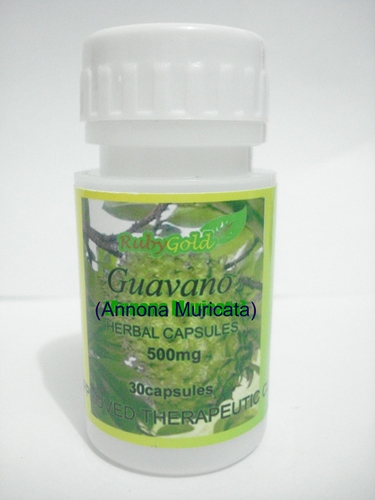
Soursop "Graviola" (Annona Muricata) 30 Capsule 500mg
Soursop or Graviola is native to the Amazon rainforest; a small tree growing up to 15 feet (5 meters) tall, it is much sought after for its delicious fruit.
However, Graviola bark, leaves, root, and fruits have been used as traditional remedies in South America for centuries.
There is ongoing cancer-research on this plant concerning the specific phytochemicals (Annonaceous acetogenins) that are demonstrating the strongest anticancer and antiviral properties.
Servings Per Container: 30 capsules
Dosage
The leaves are used for the herbal dietary supplement.
Take one capsule thrice a day.
Extracts have been shown to have antiviral, antiparasitic, antirheumatic, astringent, emetic, antileishmanial and cytotoxic effects. Graviola has also been shown to be effective against multi-drug resistant cancer cells line.
Benefits
Graviola seems to effectively target and kills malignant cells in more than 10 different types of cancer, including colon, breast, prostate, lung, and pancreatic cancer.
It is believed to be far stronger in killing colon cancer cells than Adriamycin® (Doxorubicin hydrochloride), a chemotherapy given as treatment for certain types of cancer. It may be a natural alternative as such for cancer treatment.
Graviola hunts down selectively – and kills cancer cells without harming healthy cells; unlike chemotherapy that indiscriminately seeks and destroys all actively reproducing cells – (even normal, healthy ones).
Research on this plant has focused on its anti-cancerous effect but the plant has been used for a long time in traditional medicine in Surinam to treat a number of ailments, such as: hypertension, ringworm, influenza, scurvy, rashes, malaria, neuralgia, dysentery, arthritis, palpitations, rheumatism, nervousness, high blood pressure, insomnia, diarrhea, fever, nausea, boils, dyspepsia, and muscle spasm.
General uses: cancer treatment, herpes, infections, parasitic infections, sedation.
Phytochemicals Annona muricata
Acetogenins, quinolines, isoquinolines, annopentocins and annomuricins, Coreximine, reticuline subfractions.
Acetaldehyde, Amyl-caproate, Amyloid, Annonain, Anomuricine, Anomuricinine, Anomurine, Anonol, Atherosperminine, Beta-sitosterol, Campesterol, Cellobiose, Citric-acid, Citrulline, Coclaurine, Coreximine, Dextrose, Ethanol, Folacin, Fructose, Gaba, Galactomannan, Geranyl-caproate Glucose, HCN, Isocitric-acid, Lignoceric-acid, Malic-acid, Manganese, Mericyl-alcohol, Methanol, Methyl-hex-2-enoate, Methyl-hexanoate, Muricine, Muricinine, Muricapentocin, Muricoreacin, Myristic-acid, P-coumaric-acid, Paraffin, Potassium-chloride, Procyanidin, Reticuline, Scyllitol, Stearic-acid, Stepharine, Stigmasterol, Sucrose, Tannin, Xylosyl-cellulose
Pharmacology
Methanolic extract of Annona muricata (Annonaceae) seeds was tested for antiparasitic activity against E. histolytica, N. brasiliensis, M. dessetae and A. salina.
The acetogenins (natural chemicals) are found to be responsible for the important activity.
In a plant screening program by the National Cancer Institute, the leaves and stem of Graviola showed active cytotoxicity against cancer cells.
Focus of the research was on a novel set of phytochemicals (annonaceous acetogenins).
Fractionation of the leaves resulted in the isolation of two new Annonaceous acetogenins, muricoreacin and murihexocin C. These compounds showed significant cytotoxicities among six human tumor cell lines with selectivities to the prostate adenocarinoma (PC-3) and pancreatic carcinoma (PACA-2) cell lines.
The antitumor, properties of these annonaceous acetogenins have been reported.
Researchers reported that the Annonaceous acetogenin, bullatacin, preferentially killed multi-drug resistant cancer cells because it blocked production of adenosine triphosphate, ATP (the chief energy-carrying compound).
Surviving cancer cells from chemotherapy may develop resistance to the agent originally used against them as well as to other, even unrelated, drugs (multi-drug resistance or MDR).
The fruit and the leaves of Annona muricata are used in traditional medicine for their tranquillizing and sedative properties.
Extracts of the plant have been shown results that imply that the fruit possesses anti-depressive effects, possibly induced by three alkaloids, annonaine (1), nomuciferine (2) and asimilobine (3), isolated from the fruit.
Fractionation of the leaves resulted in the isolation of annopentocins A B and C and cis- and trans-annomuricin-D-ones.
